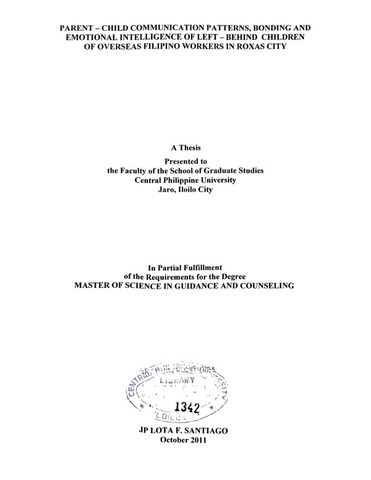| dc.description.abstract | The primary of objective of this study was to determine the parents’ and children’s preference for alternative living arrangement for the elderly in urban China. The study further aimed to determine the relationship between characteristics and attitudes of both the parents and children towards living arrangement, present living arrangement and their preference for alternative living arrangement for the elderly.
The respondents of the study consisted of 768 randomly selected people aged 20 years old and older coming from the four communities of the Haidian District in Beijing, China.
This study utilized the one-shot survey design. To gather the data needed, the researchers used two types of questionnaires: the personal information sheet and checklist questionnaire to answer the specific of objectives of the study. The data were coded, encoded and analyzed by computer using the software, Statistical Package for Social Sciences (SPSS).
The study hypothesized that the parents’ and the children’s preferences towards living arrangement for the elderly vary according to their personal characteristics such as age, sex, civil status, educational attainment, occupational status, monthly income, family size and place of origin.
It was hypothesized further that there was no significant relationship between their characteristics and attitudes towards living arrangement, present living arrangement and their preference for alternative living arrangement for the elderly.
Majority findings
Parents
1. Out of the total respondents, majority of the parents are married, college graduates, earned income of 10,001 RMB and above, and belonged to the age bracket of 40-49 years. Of this number, 50% are males and 50% are females and majority of them have only one child.
2. Majority of the parents are living together with their children, while others preferred to live alone. At present, none of them is living in the nursing home and community for the aged.
3. The parents had mostly agreed to the attitude about elderly living Arrangement.
4. No significant relationship exist between the parents’ personal characteristics when grouped according to age, sex, civil status, educational attainment, occupation, monthly income, family size and place of origin and their attitude towards living arrangement of elderly in terms of the attitudes listed, their present living arrangement and the parents’ preference for alternative living arrangement.
Children
1. Out of the total respondents, majority of the children are married, graduates of high school/technical secondary school, earned income of 10,001 RMB and above, and belonged to the age bracket of 30-39 years. Of this number, 50% are males and 50% are females and majority of them have only one child.
2. Majority of the children respondents are presently living “together with children”, while others are living alone. None of them is living in the nursing home and community for the aged.
3. The children respondents preferred for alternative living arrangement for they want to “live alone”. Other reasons of the children include: live together with children, live in community of the aged and other will stay in nursing home.
4. No significant relationship exist between the children’s personal characteristics when grouped according to age, sex, civil status, educational attainment, occupation, monthly income, family size and place of origin and their attitude towards living arrangement of elderly in terms of the attitudes listed, their present living arrangement and the children’s preference for alternative living arrangement.
Conclusions
1. Generally, majority of the parents and children are married, college and high school/technical secondary school graduates, earned income of 10,001 RMB and above, and belonged to the age bracket of 40-49 years and 30-39 years old. Of this number, 50 percent are males and 50 percent are females and majority of them have only one child.
2. It is concluded that majority of the parents and children are living together with their children while others preferred to live alone. At present, none of them is living in the nursing home and community for the aged. Thus, Chinese are family-orientation. The elderly like to live with their children. But children are very busy. They can not take care of their parents in the day. Children also want to see their parents every day. Almost Chinese parents reject to live in nursing home. The elderly should live with their children or they can often see their children.
3. However, it is also concluded that the parents and children respondents had mostly agreed to the attitude about elderly living arrangement, except for those who are earning an income of 6,000 RMB and below who have mostly disagreed to the attitude about elderly living arrangement.
4. Likewise, the parents and children respondents preferred for present living arrangement because they want to “live together with their children” and to “live alone”. | en_US |






